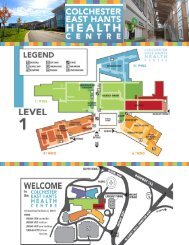Frequently Asked Questions about Allergy and Anaphylaxis
Frequently Asked Questions about Allergy and Anaphylaxis
Frequently Asked Questions about Allergy and Anaphylaxis
Create successful ePaper yourself
Turn your PDF publications into a flip-book with our unique Google optimized e-Paper software.
efore they are noticed by others. Children have unique ways of describing their<br />
experiences <strong>and</strong> perceptions <strong>and</strong> allergic reactions are no exceptions. Precious time is<br />
lost when adults do not immediately recognize that a reaction is occurring or don’t<br />
underst<strong>and</strong> what a child is telling them. When a reaction begins, it is important to<br />
respond immediately, following instructions in the person’s <strong>Anaphylaxis</strong> Emergency<br />
Plan. The cause of the reaction can be investigated later.<br />
Because of the unpredictability of reactions, early symptoms should never be ignored,<br />
especially if the person has suffered an anaphylactic reaction in the past.<br />
2<br />
4. If a child is having an anaphylactic reaction you administer Epipen, Twinject or<br />
Allerject before calling 911. True or False?<br />
True. If you are alone with someone who is having an anaphylactic reaction,<br />
administer their Epipen, Twinject or Allerject prior to calling 911. If there are other<br />
people present, have someone else call 911 <strong>and</strong> report back to you while you stay <strong>and</strong><br />
administer the auto-injector.<br />
5. You always lay a person down flat when treating them for anaphylaxis. True or<br />
False?<br />
True: To improve blood circulation, caregivers should lift the person’s legs above the<br />
level of the heart, keeping the legs raised by putting something (e.g. a pillow) underneath.<br />
They should keep the person lying down until emergency responders arrive or until the<br />
patient has fully recovered.<br />
If the person feels nauseated or is vomiting, lay the person on his or her side, head down,<br />
to prevent choking on vomit<br />
It is important that the patient not be made to sit or st<strong>and</strong> immediately following a<br />
reaction as this could result in another drop in blood pressure.<br />
6. It would be helpful to practice regularly with EpiPen/Twinject/Allerject<br />
demonstrators so that you are ready for an emergency. True or False?<br />
True. Studies have shown that patients, parents of allergic children, caregivers,<br />
teachers, <strong>and</strong> even healthcare professionals often cannot correctly administer the autoinjector<br />
when needed.




